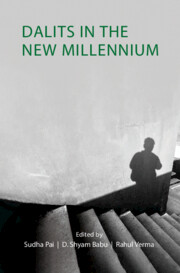Book contents
- Frontmatter
- Contents
- List of Figures
- List of Tables
- Acknowledgements
- 1 Introduction: Dalit Discourse in the New Millennium
- Part I Shifting Patterns of Electoral Politics
- Part II Popular Culture, Discourse, and Protest
- Part III Transformations in Ideology and Identity
- 11 Annihilation, Identity, Representation: Kanshi Ram and the Conundrums of Dalit Political Agency
- 12 Reading Caste and Class Together: A Dalit–Bahujan–Left Alliance?
- 13 Towards Radical Democracy: The Dalit–Bahujan Claim for Political Power
- 14 Liberation Panthers and the Dalit Challenge to Hindutva in Tamil Nadu
- 15 Dalit–Bahujan Politics: Crisis and Future
- Part IV Aspirations and Anxieties
- Part V Discrimination and Representation
- About the Contributors
- Index
15 - Dalit–Bahujan Politics: Crisis and Future
from Part III - Transformations in Ideology and Identity
Published online by Cambridge University Press: 12 July 2023
- Frontmatter
- Contents
- List of Figures
- List of Tables
- Acknowledgements
- 1 Introduction: Dalit Discourse in the New Millennium
- Part I Shifting Patterns of Electoral Politics
- Part II Popular Culture, Discourse, and Protest
- Part III Transformations in Ideology and Identity
- 11 Annihilation, Identity, Representation: Kanshi Ram and the Conundrums of Dalit Political Agency
- 12 Reading Caste and Class Together: A Dalit–Bahujan–Left Alliance?
- 13 Towards Radical Democracy: The Dalit–Bahujan Claim for Political Power
- 14 Liberation Panthers and the Dalit Challenge to Hindutva in Tamil Nadu
- 15 Dalit–Bahujan Politics: Crisis and Future
- Part IV Aspirations and Anxieties
- Part V Discrimination and Representation
- About the Contributors
- Index
Summary
This chapter aims to focus on the process and causes of the gradual decay of the Bahujan Samaj Party (BSP)-led Dalit–Bahujan movement in India. It will critically evaluate Dalit politics and the Dalit movement in north India – its forms and content, its language and epistemology, its issues and agendas, and the mobilizational politics followed by it. In the chapter, I would like to discuss how and why the Dalit movement in north India is facing a crisis, why internal weaknesses are being produced within it, and how these weaknesses are contributing to the gradual weakening of the mainstream Dalit movement. We will also explore the challenges to the Dalit movement which are emerging from rival political forces. Thus, this chapter will try to present a critical review of Dalit politics in north India and assess its future in the country. This chapter has evolved through an amalgam of historical methodology for mapping the crisis of the Dalit–Bahujan movement. Drawing on my own fieldwork over many years in varied villages of Uttar Pradesh (UP), I have tried to understand the longue durée, or long-run processes, historical structures, and relations of the Dalit–Bahujans. I have also used various newspaper reports to substantiate and support my arguments here.
Called the ‘Bahujan movement’ following the name given to the Dalit movement by Kanshi Ram, since Dalits and lower castes constitute the bahujan, or the majority population, the movement in the state of UP in north India took the form of a political movement under a political party – the BSP – launched in 1984 (Pai, 2002). The party saw a sharp rise in support under its next leader, Mayawati, but unfortunately, the Bahujan movement did not focus on social issues concerning Dalits like their exploitation, killing, and rape (Pai, 2020).
It is true that the BSP has not launched any big social movement for the last few decades (Narayan, 2012). It mainly focuses on fighting for electoral success, but since 2007, when it swept the assembly elections in UP, it has not seen any major achievements in electoral politics either in UP or in any other part of India.
- Type
- Chapter
- Information
- Dalits in the New Millennium , pp. 267 - 282Publisher: Cambridge University PressPrint publication year: 2023



